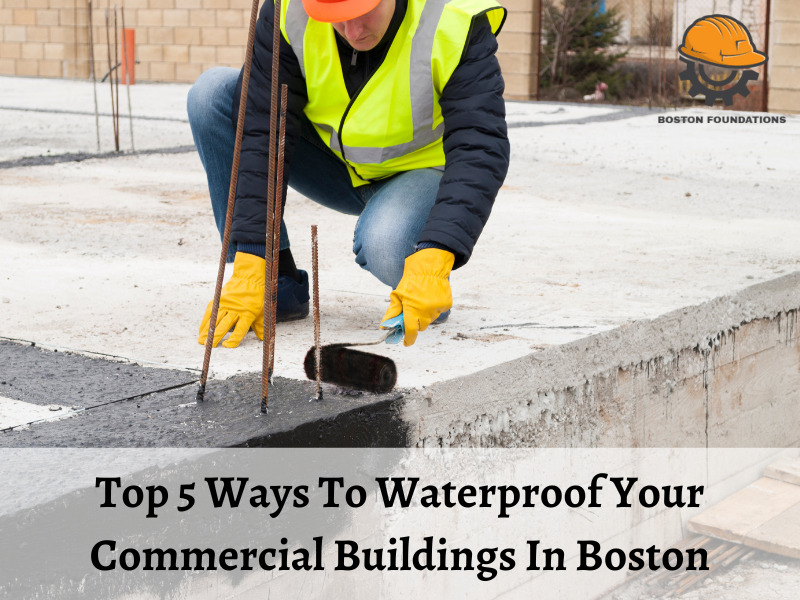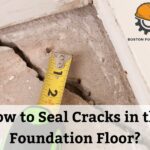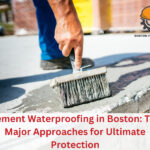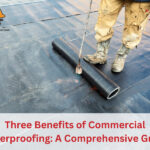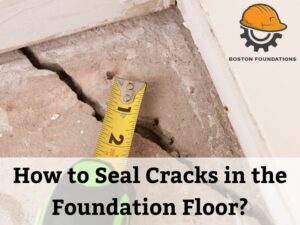Introduction
When protecting your commercial building from water damage, it is crucial to understand the vulnerabilities that exist. Boston’s climate poses unique challenges, with heavy rainstorms and snowfall throughout the year. These weather conditions can lead to leaks, flooding, and moisture seepage in your building’s foundation, walls, roof, or windows. Let’s dive into the top 5 ways Commercia Waterproofing in Boston ensures protection against water damage. Regarding Commercial Waterproofing Boston, you can take a few key steps to safeguard your building.
- Consider hiring professional concrete contractors who specialize in Commercial Waterproofing in Boston.
- These experts have the knowledge and experience to assess your building’s needs and provide effective solutions.
- They can identify any areas of vulnerability, such as cracks or weak spots in the foundation, and recommend appropriate repairs or treatments.
In addition to hiring concrete contractors, it’s essential to prioritize foundation repair Boston. A solid and stable foundation prevents water intrusion into your commercial building. Regular inspections should be conducted by professionals who specialize in foundation repair. They can identify any signs of damage or deterioration early on and take necessary measures to address them promptly. Investing in proactive maintenance and repairs for your building’s foundation can significantly reduce the risk of water damage and associated costs.
Why Commercial Waterproofing in Boston is Crucial for Business Success
Ensuring the commercial waterproofing Boston of your commercial property is crucial for safeguarding your business’s success and mitigating the devastating financial consequences of water damage. The city’s climate, with its heavy rainfall and occasional storms, puts commercial buildings at a higher risk of water infiltration.
Water damage can lead to significant disruptions in your operations, potentially causing you to halt business activities while repairs are being made. This downtime can result in lost revenue and missed opportunities and negatively impact your reputation among customers.
Moreover, the financial implications of water damage go beyond just repair costs. If not addressed promptly and effectively, water infiltration can cause structural damage to your building’s foundation and walls.
It could require extensive repairs or even reconstruction, which can be incredibly expensive and time-consuming. There is also the potential for mold growth if moisture is not adequately managed after water damage occurs.
By investing in proactive waterproofing measures for your commercial building in Boston, you can significantly reduce these risks and disruptions. Waterproofing solutions such as sealants, coatings, drainage systems, and proper insulation can help prevent water from infiltrating your property in the first place.
By taking preemptive steps to protect against water damage, you are safeguarding your business’s physical assets and ensuring its long-term success by avoiding costly repairs that could have been prevented with proactive maintenance measures.
Identifying Vulnerabilities in Commercial Buildings
Finding weak points in commercial structures is essential for safeguarding against potential risks and interruptions brought on by water damage. Water intrusion can cause various problems, such as structural damage, the growth of mold, and a decline in the air quality inside the home.
One common area prone to water intrusion is the roof. Leaks in the roof can result from damaged or missing shingles, poor installation, or clogged gutters. These issues can allow water to seep into the building, causing damage to ceilings, walls, and even electrical systems. Another vulnerable area is the foundation. Cracks in the foundation walls or floors can provide an entry point for water during heavy rain or flooding events. Regular inspections can help detect these vulnerabilities early on so that necessary repairs or waterproofing measures can be implemented promptly.
Other potential areas of vulnerability include windows and doors. Improperly sealed windows or doors can allow rainwater to enter the building and cause damage over time. Also, plumbing systems should be inspected regularly, as leaks or pipe failures can result in significant water damage if left unchecked. By identifying these vulnerabilities through inspections and taking appropriate actions such as resealing windows, repairing roof leaks, sealing foundation cracks, and maintaining plumbing systems properly, you can minimize the risk of water intrusion and protect your commercial building from potential costly damages and business disruptions caused by water damage.
Top 5 Effective Ways to Waterproof Your Commercial Buildings in Boston
If you want to waterproof your commercial buildings in Boston effectively, you should consider five key methods.
Cementitious Waterproofing
Are you looking to prevent water damage to your Boston commercial building? Cementitious waterproofing is viable for keeping your property safe, secure, dependable, and affordable. Concrete contractors place a form of coating called cementitious waterproofing directly on the surface of masonry or concrete structures. It creates a shielding barrier that stops water from penetrating and causing harm.
The application involves mixing cement-based materials with water to create a paste-like substance. This mixture is then applied to the surface using brushes, rollers, or sprayers. Once dry, it forms a hard, durable layer that effectively seals out moisture.
One of the advantages of cementitious waterproofing is
- Versatility can be used on new and existing construction projects, making it suitable for any commercial waterproofing Boston.
- Affordability compared to other waterproofing methods such as membrane systems or epoxy coatings.
However, it’s important to note that cementitious waterproofing has limitations regarding extreme temperature fluctuations or structural movement. It may crack over time if not properly maintained.
Overall, cementitious waterproofing offers an effective and budget-friendly solution for protecting your commercial building in Boston from water damage.
Liquid Membrane Waterproofing
Consider employing liquid membrane waterproofing to prevent water damage to your commercial property in Boston. It is a flexible and affordable solution that can successfully block out moisture and keep your facility safe and secure. To provide a barrier against water penetration, concrete contractors place a form of coating known as liquid membrane waterproofing on the building’s surface. It comprises a malleable liquid substance that clings to the substrate and hardens to produce a seamless membrane.
The benefit of liquid membrane waterproofing is its
- Versatility can be applied to various surfaces, including concrete, metal, wood, and roof membranes. It suits different areas of your commercial building, such as roofs, balconies, foundations, and parking decks.
- Cost-effectiveness Compared to other methods like sheet membranes or cementitious coatings, liquid membranes are generally less expensive. They require less labor-intensive installation and can be applied quickly with minimal disruption to your business operations.
However, there are some potential drawbacks when using liquid membrane waterproofing. One is that they may be less resistant to puncture or heavy foot traffic than other waterproofing systems. Therefore, extra caution should be taken during construction or maintenance activities on treated surfaces. Additionally, proper surface preparation is crucial for ensuring adhesion and long-term performance.
Bituminous Coating Waterproofing
Your industrial property in Boston can be effectively and affordably protected from water damage with bituminous coating waterproofing. This sort of waterproofing is made of bitumen, a viscous, sticky liquid produced during the distillation of crude oil. It is often black or brown. It is combined with other substances like fillers, solvents, and additives to create a robust coating that can successfully thwart water penetration.
When it comes to application techniques, a bituminous coating can be applied using various methods such as brush or roller application, spray application, or by pouring it directly onto the surface. It adheres well to a wide range of surfaces, including concrete, metal, masonry, and wood. This versatility makes it suitable for different areas of your commercial building, such as roofs, foundations, basements, and parking decks.
One of the main advantages of bituminous coating waterproofing is
- Excellent resistance to moisture and chemicals. It forms a seamless barrier that prevents water from seeping through cracks or gaps in the surface.
- Additionally, it provides good UV protection and thermal insulation properties, which can help reduce energy costs.
However, it’s important to note that bituminous coatings have limitations too. They may require regular maintenance and reapplication over time due to wear and tear or exposure to harsh weather conditions. Furthermore, they are unsuitable for areas with high foot traffic as they can become slippery when wet.
Overall, bituminous coating waterproofing is an excellent way to prevent water damage in your Boston commercial buildings. Its makeup makes it simple to apply to various surfaces and offers enduring defense against moisture infiltration.
Bituminous Membrane Waterproofing
Using bituminous membrane waterproofing is one of the most versatile and durable solutions for protecting structures from water damage. This type of waterproofing involves applying a layer of bitumen, a sticky, black, and viscous substance, onto a surface to create a barrier against water penetration. Bituminous membranes are typically made up of layers of bitumen mixed with various additives and reinforcement materials such as fiberglass or polyester. Combining these materials provides excellent resistance to water, UV rays, chemicals, and mechanical stress.
There are different types of bituminous membranes available in the market, including.
Torch-applied membranes: Torch-applied membranes require heat during installation to melt the bitumen and ensure proper adhesion to the substrate.
Self-adhesive membranes: Self-adhesive membranes have an adhesive backing that allows easy installation without needing heat or specialized equipment.
Cold-applied membranes: Cold-applied membranes are installed using adhesives or primers that do not require heating.
Bituminous membrane waterproofing can be applied on various surfaces, such as concrete decks, metal roofs, masonry walls, and foundation walls. It is essential to ensure the surface is clean and free from debris or loose particles before installing the membrane. The membrane should be properly installed following manufacturer guidelines and providing proper overlap between adjacent sheets to create a continuous barrier.
Polyurethane Membrane Waterproofing
Experience the superior protection and flexibility of polyurethane membrane waterproofing for your structures, ensuring lasting defense against water infiltration. Polyurethane membrane waterproofing is a highly effective method for preventing water damage to commercial buildings in Boston. This type of waterproofing consists of a liquid coating that forms a seamless barrier when applied to surfaces such as concrete, metal, or wood. It offers excellent adhesion and can be easily applied to both horizontal and vertical surfaces.
One of the key advantages of polyurethane membrane waterproofing is
- Ability to withstand extreme weather conditions. Whether it’s heavy rain, snowstorms, or high humidity levels, this waterproofing system provides reliable protection against water penetration.
- Versatility in application methods. It can be spray-applied or roller-applied, depending on the project’s specific requirements. It suits various surfaces and allows easy installation even in hard-to-reach areas.
However, it’s important to note that polyurethane membrane waterproofing may not be suitable for all surfaces. It requires proper surface preparation before application to ensure optimal adhesion and performance.
If you’re looking for an effective method to protect your commercial buildings in Boston from water damage, consider using polyurethane membrane waterproofing. Its seamless barrier provides superior protection and flexibility, allowing it to withstand extreme weather conditions.
Conclusion
To ensure long-lasting protection for your commercial buildings in Boston, consult with professionals in Commercial Waterproofing Boston who can guide you in selecting the proper waterproofing method tailored to your needs and requirements. With various waterproofing ways available, choosing the most suitable one for your building’s unique characteristics and conditions is crucial. Whether you are dealing with a concrete structure or a foundation repair project, experts in concrete contractors can provide advice and recommendations based on their knowledge and experience.
By consulting with professionals like Boston Foundation Repair, you can have peace of mind knowing that they will thoroughly assess your building’s vulnerabilities and suggest the best solution. Foundation Repair Boston considers factors such as the type of materials used in construction, potential water sources, and the overall condition of your building. This personalized approach ensures that the chosen waterproofing method effectively addresses existing issues while preventing future water damage. Investing in a Foundation Repair Boston professional guidance saves you time and helps prevent costly mistakes.
Frequently Asked Questions
- How is a commercial building waterproofed?
Commercial buildings are waterproofed through various methods, including installing a waterproofing membrane on the exterior walls and foundation, using sealants on windows and doors, and properly sloping the roof to prevent water accumulation.
- How do you waterproof a commercial building?
Waterproofing a commercial building involves several steps. First, identify any areas prone to water leakage such as roofs, walls, and foundations. Apply waterproof coatings or membranes to these areas to prevent water penetration. Regular maintenance and inspections are also essential to ensure long-term water resistance.
- Which cement is used for waterproofing?
The type of cement commonly used for waterproofing is called Portland cement. It is a versatile and durable material that creates a strong bond, making it ideal for various waterproofing applications such as basements, roofs, and swimming pools.
- Is bitumen good for waterproofing?
Yes, bitumen is an excellent choice for waterproofing. It is a durable and flexible material that forms a strong seal, making it ideal for use in roofing, road construction, and other applications where waterproofing is necessary.
- How do I choose a waterproofing company?
Choosing the right waterproofing company for your needs is crucial to ensure quality and long-lasting results. Factors to consider include their experience, reputation, customer reviews, expertise in waterproofing techniques, and the use of high-quality materials.

